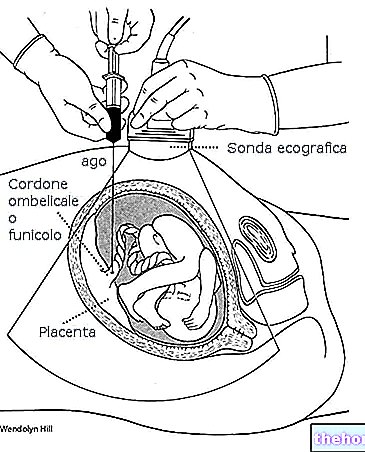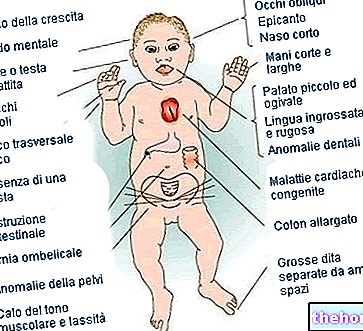
Many "novice" mothers experience a physiological discomfort called "baby blues", which often occurs after the baby is born and usually includes mood swings and crying fits that resolve quickly. Other new mothers, however, undergo a more severe and lasting form of depression, known as postpartum depression. Finally, even more rarely, an extreme form of postpartum depression known as postpartum psychosis occurs after the baby is born.
Postpartum depression is neither a weakness nor a character flaw. Sometimes it is simply a complication of childbirth. If you experience postpartum depression, prompt treatment can help keep your symptoms under control and enjoy your baby to the fullest.
.
Symptoms of the so-called baby blues, which lasts only a few days to a maximum of one or two weeks, can include:
- Mood swings;
- Anxiety;
- Sadness;
- Irritability;
- Cry;
- Loss of concentration;
- Sleep disorders.
When experiencing genuine postpartum depression, the symptoms may be similar to those of the baby blues, but of greater intensity and longer duration, such as to sometimes interfere with the ability to take care of the baby, or in the management of other activities.
Postpartum depression can be characterized by these symptoms:
- Loss of appetite
- Insomnia;
- Intense irritability and anger;
- Heavy fatigue;
- Loss of interest in sex
- Loss of enthusiasm for life
- Feelings of shame, guilt and inadequacy;
- Severe mood swings;
- Difficulty bonding with your child;
- Isolation from family and friends;
- Thoughts of hurting or hurting the baby.
Postpartum depression, if left untreated, can last for months or longer.
If postpartum depression evolves into postpartum psychosis or if after the birth of the child one goes directly to postpartum psychosis (rare condition, but which if it occurs begins in the first two weeks after birth), the symptoms are still more stringent and may include:
- Confusion and disorientation;
- Hallucinations and delusions;
- Paranoia;
- Attempt to hurt yourself or the child.
Generally, if you feel depressed after the birth of your baby, you may be reluctant or embarrassed to talk about your state of mind. However, it is important to call your doctor if the signs and symptoms of depression show any of these characteristics:
- They don't disappear after two weeks;
- They get worse;
- They make it difficult for the new mother to take care of her baby;
- Thoughts of harming or hurting the baby arise.
If you suspect that postpartum psychosis is developing, you should see your doctor right away. Don't wait and hope that the condition will improve on its own, as - if neglected - postpartum psychosis can lead to life-threatening thoughts or behaviors.
For further information: Postpartum Depression Symptoms and progesterone) can contribute to postpartum depression. Other hormones produced by the thyroid gland can decrease dramatically, leaving a feeling of tiredness, laziness and depression. Changes in blood volume, blood pressure, immune system and metabolism are additional factors that can lead to mood swings and fatigue.The risk of developing postpartum psychosis is higher in women who have bipolar disorder.
and eating, temper tantrums and hyperactivity. Furthermore, it is possible that these children experience delays in language development.
Untreated postpartum depression can last for months or even longer; sometimes it can become a chronic depressive disorder. Even when treated, this condition can increase a woman's risk of developing major depression in the future.
In depth: what to do before going to the doctor and what to expect from a medical visit
In the event that there are symptoms suggestive of postpartum depression, it is useful:
- Write down each symptom experienced and for how long it occurred;
- Write down all medical problems, including other physical problems and mental conditions that have been diagnosed. Tell your doctor if you have experienced any type of depression or another mental disorder in the past;
- Make a list of all the medicines you take, including over-the-counter medicines, vitamins, and supplements.
- Find a trusted friend or family member to go on a first date with, so that you can be helped in discussing all of the points written;
- Write down the questions you would like to ask the doctor.
Common questions asked of doctors include:
- What is the diagnosis and what type of treatment is best suited to the case.
- Ask what are the side effects of the treatment that is proposed to us.
- How and after how long from the beginning of the treatment is expected an improvement of the disorders.
- Is that drug safe if you are breastfeeding?
- How long should the therapy be continued?
- What lifestyle changes could help us manage symptoms?
- How often should a follow-up visit be made?
- If in the future we can face other mental illnesses.
- Can postpartum depression come back even if you want more babies?
- Is there any way to prevent it if you have other children?
- Are there any websites or information material from which you can get information?
Postpartum depression itself is often treated through proper counseling and therapy. As far as counseling is concerned, it may be helpful to discuss your malaise with a psychiatrist, psychologist, or other professional mental health professional. Through specialist advice, you can find a better way to cope with your feelings, solve problems and achieve realistic goals. Sometimes family or couples therapy can help too.
Another possible solution derives from the use of antidepressant drugs, which are generally prescribed in the case of post-partum depression. If you are still breastfeeding, it is important to know that whatever medication you take will also go into the milk produced by your breasts. However, some antidepressants can also be used while breastfeeding because they have a very low risk of causing adverse effects to the baby. Of course, it is important to speak with your doctor to discuss the possible risks and benefits associated with the use of specific antidepressants.
The other path that can be followed involves hormonal therapy. The pharmacological intake of estrogens could counteract the rapid decline in the natural counterpart that accompanies the birth of the child, thus alleviating the signs and symptoms of post-partum depression. some women go to meet. However, research on the effective efficacy of hormonal therapy in postpartum depression is still limited. Therefore, it is necessary to evaluate with your doctor, as seen for antidepressant therapy, the risks and benefits to be encountered.
Adequate treatment of post-partum depression allows you to recover from this disorder in a few months. Obviously, in some cases the therapy lasts a little longer, the important thing is to continue it until you begin to feel better and it is the doctor himself to advise you.An early discontinuation of therapy can in fact cause relapses.
On the other hand, the treatment of post-partum psychosis is more difficult. In fact, it requires immediate admission to a hospital. Once the patient's safety is assured, she may be given a variety of medications, such as antidepressants, antipsychotics, and mood stabilizers, to control the signs and symptoms. Sometimes anticonvulsant therapy is prescribed, during which small electric shocks low intensity are applied to the brain to produce the same brain waves that occur during a seizure. The chemical changes that occur following the application of electrical current can reduce symptoms of depression, especially when other treatments have been ineffective. or when you want immediate results.
Treatment of postpartum psychosis can call into question the mother's ability to breastfeed her baby. In fact, separation from the baby makes breastfeeding difficult, and some treatments used for postpartum psychosis are not recommended for women who are breastfeeding.
For further information: Regular Postpartum Depression Medicines, such as a walk with your baby to include in your daily activities. Eat healthy foods and avoid alcohol.








.jpg)


















